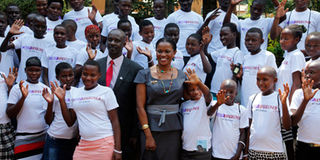Abnormal bed-wetting could be sign of diabetes - doctors

Buganda Kingdom queen Sylvia Nagginda (centre) and Dr Gerald Mutungi (right of Ms Nagginda, the director non communicable diseases pose with diabetic children at Taibah Intentional School Monday . PHOTO BY Stephen WANDERA.
What you need to know:
Advice. Health workers have urged parents to take their children early for medical check-up.
Wakiso. Abnormal bed-wetting in children, dehydration and loss of weight are some of the signs of diabetes type one, a disease that is silently killing children, according to health experts.
Dr Thereza Pileys, a children diabetics specialist, warned that parents who ignore to take their children for early medical check-up, risk losing them to the non communicable disease.
“When the pancreas fails to produce enough bile duct in the body, that deficiency causes diabetes type one common in children. This is common in Uganda but we do not have specialists in the country. For instance, we only register 1,000 cases annually, according to statistics recorded from referral hospitals upcountry and from Mulago and Nsambya hospitals,” Dr Pileys said.
NGO lauched
She was speaking at the launch of Sonia Nabeta Foundation, an NGO aimed at creating awareness about diabetes type one at Taibah International School on Monday. The function was presided over by Buganda Kingdom queen Sylvia Nagginda.
Contrary to common belief, Dr Pileys said diabetes type one is not caused by life style.
“It happens if the body fails to produce enough insulin,” she said.
She noted that several child diabetes cases have been mismanaged by ignorant health workers.
Dr Gerald Mutungi, the director non communicable diseases, said children in Uganda suffering from diabetes type one die because of lack of diagnosis.
“You find a health worker who thinks the child has malaria and administers bottles of drips and quinine injections, thereby participating in the killing of the child. You will later hear a parent say the health worker tried his best by putting many bottles of drips,” he said.
The Nabaggereka urged parents to create awareness about the disease.
“No child should be left out at school or at home. The better we know about the disease, the better we can manage it. This will ensure those affected live a longer quality life,” she said.




